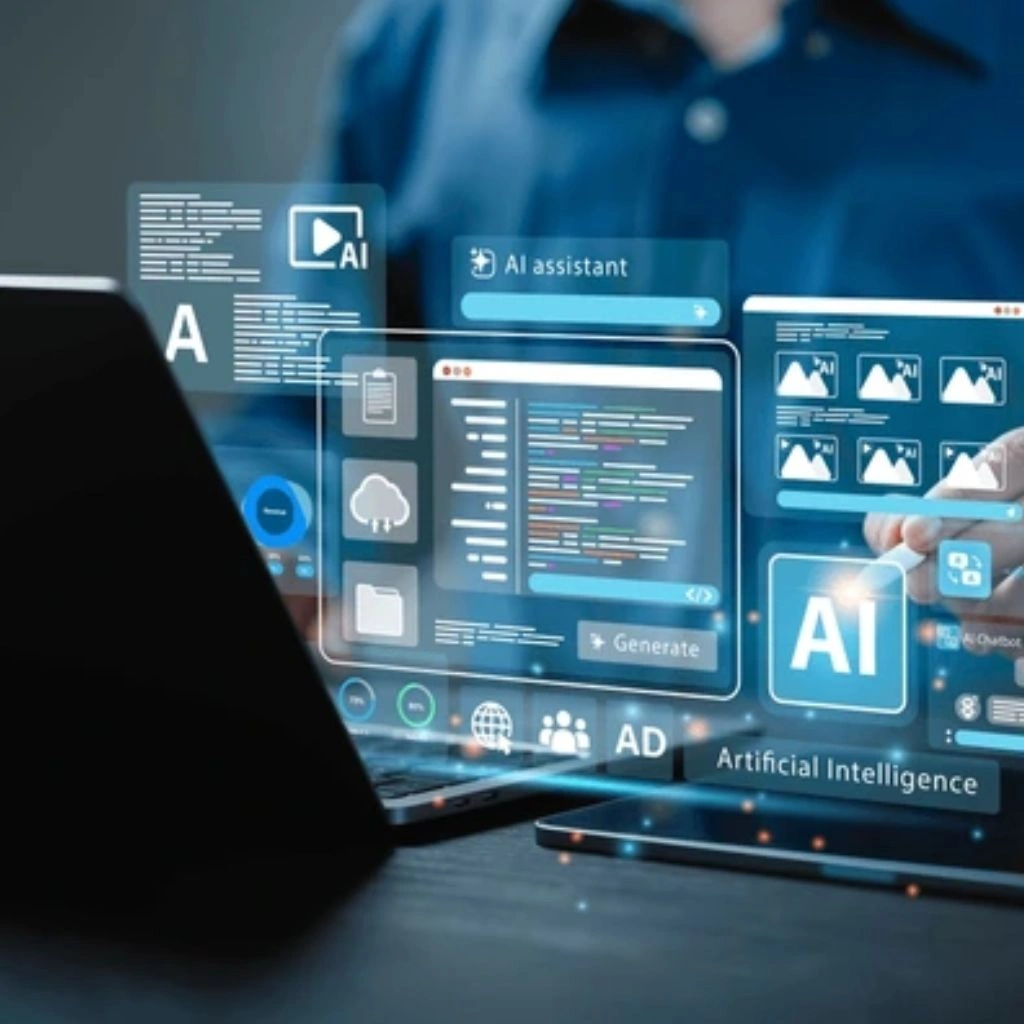What role does artificial intelligence (AI) play in transforming modern healthcare?
Over the last few years, AI has moved from a buzzword to a game-changing tool in healthcare, revolutionizing everything from patient care to operational efficiency. With its ability to analyze large datasets, learn from patterns, and make predictions, AI in modern healthcare is reshaping how healthcare professionals diagnose, treat, and manage patients.
While AI is still evolving, its current applications offer significant improvements in accuracy, efficiency, and patient outcomes. But how exactly is AI changing the landscape of healthcare? In this guide, we’ll explore how AI is enhancing patient care, reducing costs, improving operational efficiency, and reshaping the future of medicine.
How is AI Improving Diagnosis and Treatment in Healthcare?
AI is making significant strides in improving the accuracy and speed of diagnosis, a critical component of healthcare. Traditional diagnosis often involves human error or delays due to the sheer volume of patient data and complex medical conditions. AI tools help overcome these challenges by analyzing vast amounts of data, detecting patterns, and offering real-time insights that assist healthcare professionals in making more accurate decisions.
For example, AI-powered diagnostic tools can analyze medical imaging (such as X-rays, MRIs, and CT scans) and identify abnormalities like tumors, fractures, or signs of diseases like cancer and neurological disorders. These tools use deep learning algorithms to examine images with precision, often detecting issues that might be missed by the human eye. With such tools, doctors can catch diseases earlier, improving the likelihood of successful treatment.
Moreover, AI can assist in the treatment process by predicting how patients will respond to specific treatments. By analyzing data from similar cases, AI systems can recommend the most effective treatment plans, whether it’s chemotherapy for cancer patients or medication for chronic conditions. This level of personalization helps doctors tailor their care to each patient’s unique needs, improving outcomes.
How Does AI Enhance Patient Monitoring and Care?
Patient monitoring is an essential aspect of healthcare, especially for those with chronic conditions or those recovering from major surgeries. AI plays a crucial role in enhancing continuous monitoring through wearable devices and smart sensors. These tools can track vital signs such as heart rate, blood pressure, oxygen levels, and even glucose levels in real time, allowing for timely interventions if necessary.
AI’s ability to process this data continuously and provide predictive insights is a major breakthrough. For example, AI-powered devices can alert healthcare providers to early signs of deterioration in a patient’s condition, such as an impending heart attack or a drop in oxygen levels for patients with respiratory issues. By identifying potential issues before they become critical, AI helps to improve patient outcomes and reduce hospital readmission rates.
Beyond just tracking vitals, AI can also assist in managing chronic diseases like diabetes and hypertension. Machine learning algorithms can analyze patients’ health data over time and provide personalized recommendations on diet, exercise, and medication adjustments. This personalized approach encourages better management of chronic conditions, leading to fewer complications and better overall health.
How is AI Transforming Medical Research and Drug Development?
One of the most exciting areas where AI is making an impact is in medical research and drug development. Traditionally, the process of developing new drugs and treatments has been slow, costly, and complex. However, AI is speeding up this process by enabling researchers to analyze vast amounts of biological data and predict how different compounds might affect the human body.
AI algorithms can sift through millions of chemical compounds and simulate their interactions with biological systems, helping researchers identify promising candidates for drug development much faster than traditional methods. This not only accelerates the development of new drugs but also reduces the cost of research, ultimately making treatments more affordable and accessible.
AI is also assisting in genomics and personalized medicine. By analyzing a patient’s genetic information, AI can help identify genetic markers for diseases, predict how patients will respond to specific drugs, and recommend targeted treatments that are tailored to an individual’s genetic profile. This level of precision medicine is ushering in a new era of treatment that is more effective and less prone to side effects.
How Does AI Improve Operational Efficiency in Healthcare?
Healthcare systems are notoriously complex, with multiple departments, processes, and stakeholders involved in providing patient care. Managing all of this can be a logistical nightmare, leading to inefficiencies, increased costs, and often, a diminished patient experience. AI is addressing these challenges by streamlining operations and improving efficiency in healthcare settings.
AI-powered tools can automate administrative tasks such as appointment scheduling, patient intake, and billing, freeing up staff to focus on patient care. For example, AI-driven chatbots can answer routine patient inquiries, schedule appointments, and even collect patient information before they visit a clinic or hospital. This not only saves time but also reduces human error in administrative processes.

In addition to administrative automation, AI can help optimize resource management in healthcare settings. For example, AI can predict patient volume patterns based on historical data, helping hospitals and clinics anticipate busy periods and allocate staff and resources more effectively. It can also assist in inventory management by tracking medication supplies and medical equipment, ensuring that hospitals and clinics are always prepared for patient needs without overstocking.
How is AI Enhancing the Patient Experience?
Patient experience is a critical component of healthcare, influencing everything from patient satisfaction to treatment adherence and outcomes. AI is improving the patient experience by making healthcare more personalized, accessible, and efficient.
AI-driven tools like virtual health assistants and chatbots are transforming patient engagement. These tools allow patients to ask questions, schedule appointments, and get advice on managing their health from the comfort of their own home. This convenience not only saves time for patients but also helps reduce the burden on healthcare providers, allowing them to focus on more complex cases.
Moreover, AI-powered platforms can assist in delivering personalized healthcare information to patients. For instance, by analyzing a patient’s health records, AI can provide tailored educational content about their conditions, treatment options, and lifestyle changes. This personalized approach helps patients make more informed decisions about their health, leading to better adherence to treatment plans and improved outcomes.
Telemedicine is another area where AI is enhancing the patient experience. AI is helping to analyze and process data collected during remote consultations, such as video calls, to provide real-time insights to doctors. This technology makes healthcare more accessible, particularly for patients in remote areas or those who cannot easily visit a healthcare facility.
What are the Ethical Considerations and Challenges of AI in Modern Healthcare?
While AI offers numerous benefits to healthcare, it also comes with ethical considerations and challenges that need to be addressed. One of the primary concerns is data privacy. Healthcare data is extremely sensitive, and AI systems require access to large datasets to function effectively. Ensuring that this data is securely stored and handled in compliance with privacy laws such as HIPAA is crucial to maintaining patient trust.
Another challenge is the potential for bias in AI algorithms. If AI systems are trained on biased data, they can produce skewed results, leading to inaccurate diagnoses or treatment recommendations for certain groups of patients. Addressing these biases requires careful monitoring and adjustment of the algorithms to ensure fairness and equity in healthcare delivery.
Additionally, while AI can support healthcare professionals, there is concern about how much reliance should be placed on AI systems in decision-making. While AI can assist in diagnosing and recommending treatments, the final decisions should always be made by qualified healthcare providers who can consider the nuances of each individual patient.
How Will AI Continue to Shape the Future of Healthcare?
AI in modern healthcare is still in its early stages, but its potential is immense. As the technology continues to evolve, it is expected to play an even larger role in transforming how healthcare is delivered. The future of AI in healthcare includes advancements in precision medicine, real-time patient monitoring, and even robotic surgeries, making healthcare more efficient, accessible, and effective.
Moreover, as AI systems become more sophisticated, they will be able to integrate even more data sources, such as social determinants of health, environmental factors, and lifestyle choices, to provide a more holistic view of patient care. This data-driven approach will further enhance personalized care, leading to better outcomes and healthier populations.
In the coming years, AI will continue to assist healthcare providers in making more informed decisions, improve patient outcomes, and increase the accessibility and affordability of healthcare services.
Conclusion:
AI in modern healthcare is reshaping the way we approach patient care, diagnosis, treatment, and operational efficiency. From improving diagnostic accuracy to enhancing patient monitoring and treatment personalization, AI is helping healthcare professionals provide better care and achieve improved outcomes. While challenges and ethical considerations remain, the future of AI in healthcare holds tremendous promise for advancing medical practices and making healthcare more accessible, efficient, and effective for everyone.
Ready to Upgrade Your Clinic?
Make your clinic smart, fast, and paperless with SehatPro Clinic Management Software.
Call or WhatsApp for Free Demo & ConsultationFAQs on AI in Modern Healthcare
1: How does AI help in diagnosing medical conditions?
AI analyzes vast amounts of medical data, including images, patient history, and lab results, to identify patterns that help doctors make accurate diagnoses. AI-powered diagnostic tools can spot conditions like cancer, heart disease, and neurological disorders earlier than traditional methods.
2: Can AI replace doctors in healthcare?
No, AI is not meant to replace doctors. Instead, AI serves as a tool to assist healthcare professionals by providing data-driven insights, improving diagnosis accuracy, and optimizing treatment plans. Human expertise and judgment are still essential in healthcare decision-making.
3: How does AI impact patient care and outcomes?
AI improves patient care by offering personalized treatment recommendations, continuous monitoring of vital signs, and early detection of health issues. By enabling more accurate diagnoses and proactive interventions, AI leads to better patient outcomes and reduced healthcare costs.
4: Is AI in healthcare secure?
AI in healthcare systems is designed with robust security measures to protect patient data. However, it’s crucial for healthcare organizations to ensure that AI tools comply with privacy regulations like HIPAA and take necessary steps to protect sensitive health information.
5: What are the ethical concerns of using AI in healthcare?
Some ethical concerns include data privacy, algorithmic bias, and the potential for over-reliance on AI systems. It’s important to ensure that AI is used responsibly, with proper safeguards in place to protect patient data and ensure fair treatment.




